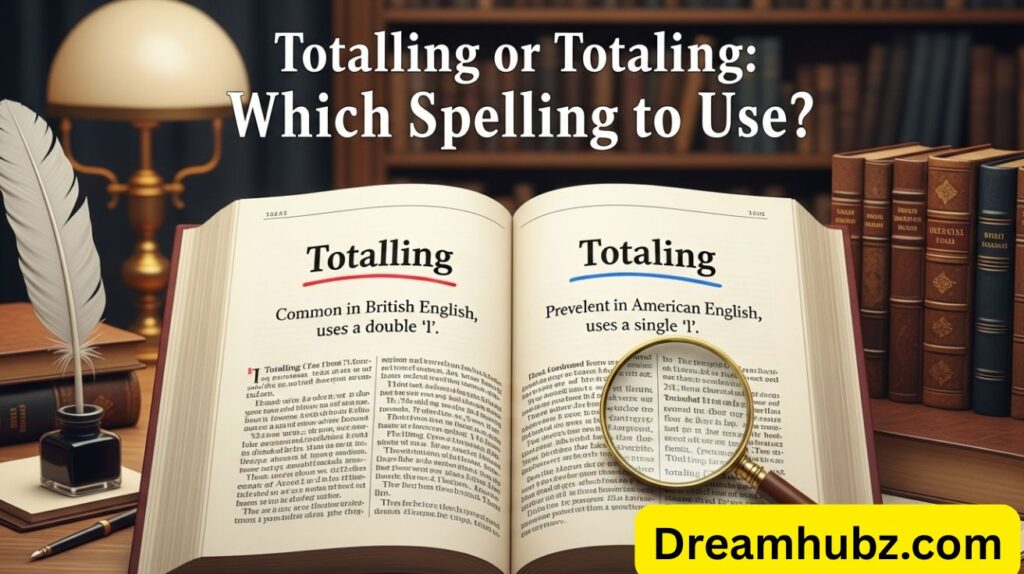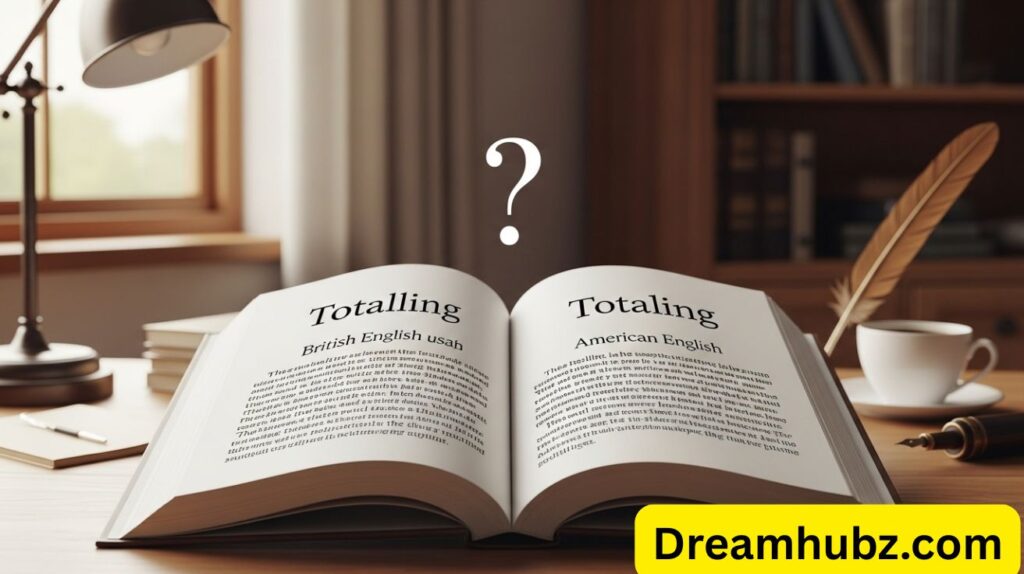Totalling or Totaling: Which Spelling to Use?
Totalling or Totaling are two different spellings of the same word. Both mean “to add up” or “to calculate a total.” The spelling changes depending on where English is used.
Small spelling changes can cause confusion. One word may look wrong to some readers. That is why knowing the right version is important.
In the UK, people write totalling with two “l’s.” In the US, people write totaling with one “l.” Both are correct, but each fits its own region.
Understanding Totalling vs Totaling

The words totalling vs totaling come from the verb “to total,” which means “to add up” or “to calculate the sum.” The totalling meaning and the totaling meaning are exactly the same. The only difference is the way they are spelled depending on regional rules.
If you are writing in totalling in British English, the spelling will almost always use a double “l.” For example, you might see “The expenses are totalling £5,000.” If you are writing in totaling in American English, the spelling uses a single “l,” as in “The expenses are totaling $5,000.” Both versions are grammatically correct, but each belongs to its own system of English language regional spelling differences.
Why the Difference Matters
It might look like a small detail, but in reality, the choice between totalling spelling and totaling spelling can have a big impact. In professional writing and spelling consistency is essential. If you are preparing an accounting report for a U.S. company, using “totalling” instead of “totaling” could appear careless. On the other hand, if you send a report to a British client with “totaling,” it may stand out as incorrect in their system.
In grammar and spelling in business communication, small mistakes like these reduce clarity and professionalism. For students, academics, or business professionals, adapting to your audience shows respect and builds credibility.
The Correct Spelling of Totalling or Totaling
So, what is the correct spelling of totalling or totaling? The answer depends on your audience.
- If your readers are in the United States, always use totaling in American English.
- If your readers are in the United Kingdom, Australia, or Canada, then totalling in British English is expected.
This choice follows the larger rules of UK vs US English and reflects broader differences such as colour vs color, organise vs organize, and travel vs travelling / traveling.
Example
Example Scenario: Email to a British Client
Dear Mr. Thompson,
I have attached the financial summary for this quarter. All amounts totalling £15,000 are included in Section 4. Please let me know if you require any adjustments.
Best regards,
Sarah
Here the word “totalling” matches British English spelling rules.
Example Scenario: Email to an American Client
Hi John,
Attached is the expense report for this month. All costs totaling $18,000 are broken down in the file. Please review and let me know if you have any questions.
Thanks,
Amanda
In this case, “totaling” follows American English expectations.
The Influence of Noah Webster
One reason for the difference comes from Noah Webster spelling reforms in the 19th century. Webster believed that English spelling should be simpler and closer to pronunciation. He removed many silent letters and doubled letters only when necessary. Because of Webster, the United States now prefers totaling rather than totalling.
His reforms also gave us many other familiar differences. For example, colour vs color, organise vs organize, cancel vs cancelling / canceling, and travel vs travelling / traveling all follow this pattern. These changes were part of Webster’s effort to make American English distinct and more logical.
British vs American Spelling Rules
British English
In British English, the rule is to double the final consonant when adding a suffix like “-ing” if the word ends in a vowel plus consonant. That is why words like “travelling,” “cancelling,” and “totalling” have two “l’s.” This rule protects the original sound of the word.
American English
In American English, the final consonant is not doubled unless the stress falls on the last syllable. That is why Americans write “traveling,” “canceling,” and “totaling.” The goal of this system was to create spelling that is shorter and easier to learn.
British vs American Spelling Differences

The following table shows common British vs American spelling differences. Notice how “totalling vs totaling” fits neatly into this pattern.
| Word | British English | American English |
| Totalling/Totaling | Totalling | Totaling |
| Colour/Color | Colour | Color |
| Centre/Center | Centre | Center |
| Organise/Organize | Organise | Organize |
| Travelling/Traveling | Travelling | Traveling |
| Cancelling/Canceling | Cancelling | Canceling |
Synonyms for Totalling/Totaling
Sometimes, instead of repeating totalling or totaling, you can use synonyms to improve your writing. Alternatives include “adding up,” “calculating sums,” “summing up,” “aggregating,” or “computing totals.”
For example, instead of writing, “The report includes expenses totaling $10,000,” you could write, “The report includes expenses adding up to $10,000.” This keeps the writing fresh and avoids repetition.
Example in Practice
Imagine an accounting report. In a British company, you might write: “The invoices totalling £12,000 are awaiting payment.” In an American company, you would write: “The invoices totaling $12,000 are awaiting payment.” Both sentences communicate the same thing, but the spelling changes with the audience.
Usage in British vs American English
British Usage: Totalling in Accounting and Finance
In the UK, totalling in British English is common in accounting and finance. Reports, tax documents, and academic writing often include sentences such as “Expenses totalling £25,000 were recorded this quarter.”
American Usage: Totaling in Everyday Speech
In the U.S., totaling in American English appears in both professional reports and everyday writing. Examples include “Revenue totaling $500,000 was recorded in Q3” or “The damage was totaling $15,000 after the accident.”
Accounting and Calculating Totals
Practical Tip:
In accounting, consistency is critical. When preparing reports, always match the spelling to the client’s location or the company’s style guide. This ensures accuracy, professionalism, and trust.
Accountant’s Report for British Audiences
“The year-end summary shows total expenses totalling £250,000, including VAT.”
Accountant’s Report for American Audiences
“The year-end summary shows total expenses totaling $320,000, including applicable taxes.”
Spelling Conventions in English
Spelling conventions in English reflect culture, history, and practicality. British English prefers traditional forms that preserve older rules, while American English values simplicity. These differences extend beyond totalling vs totaling examples to hundreds of other words in daily use. Knowing these rules is part of adapting your writing for global communication.
Key Differences
The key differences can be summarized simply. In British English, writers use tradition and often double consonants before suffixes. In American English, spelling is simplified, and double consonants are avoided unless required for pronunciation. For American readers, the correct form is always totaling.
Practical Tips for Consistency
When choosing between totalling or totaling, always think about your audience. If you are writing for an American company, stick with totaling. If you are writing for a British institution, use totalling. Use tools like Microsoft Word or Grammarly, which allow you to select U.S. or UK English spelling. Always follow a style guide, such as APA, MLA, or Chicago, if required. And most importantly, stay consistent throughout your document. Switching between “totalling” and “totaling” in the same piece will look unprofessional.
Read Also : Journeys or Journies? Mastering the Correct Plural Form
The Historical Roots of Totalling vs Totaling
The history of totalling or totaling goes back to early English spelling before standardization. In Britain, the rule of doubling the consonant when adding “-ing” has been consistent since Middle English. Words like travelling, cancelling, and totalling follow the same structure, preserving older grammar traditions. These conventions reflect how British English respects historical spelling.
In contrast, American English moved toward simplicity in the 19th century. Noah Webster spelling reforms created a more phonetic approach to spelling, making words shorter and easier to learn. This is why the U.S. prefers totaling instead of totalling. The same system explains colour vs color, organise vs organize, and other common British and American spelling variations.
Why American English Chooses Totaling
In the U.S., totaling in American English is the only correct form. Americans do not double the “l” because the stress in “total” falls on the first syllable, not the last. According to spelling rules for verbs ending in -l, doubling the consonant is unnecessary, so the word remains short and clear.
This approach reflects the American preference for professional writing and spelling consistency with simpler structures. Totaling meaning is the same as totalling meaning, but the spelling difference shows the cultural value of practicality. Americans also apply this rule to other words like canceling instead of cancelling and traveling instead of travelling.
British English and the Tradition of Totalling
In Britain, totalling in British English reflects a tradition of doubling the consonant before adding “-ing.” This rule is applied not just to “total” but also to verbs such as travel and cancel. That is why you see travelling and cancelling alongside totalling in everyday British documents, business writing, and academic reports.
These spelling conventions in English are valued in the UK because they maintain a link to the language’s historical roots. British English tends to prioritize tradition over simplification. For this reason, you will often find totalling spelling in official publications, legal texts, and accounting reports that follow UK linguistic standards.
Professional Contexts Where the Difference Matters

In grammar and spelling in business communication, even small details like “totalling vs totaling” can affect professionalism. A U.S. client expects to see “totaling” in reports, emails, and contracts, while a UK client expects “totalling.” Using the wrong form could create doubt about your attention to detail in professional settings.
Consider an accountant preparing two versions of the same report: one for New York and another for London. The U.S. version will say, “expenses totaling $50,000,” while the UK version will say, “expenses totalling £40,000.” This adaptation demonstrates cultural awareness and builds trust in international business communication.
Key Takeaway for Writers and Students
The correct spelling of totalling or totaling depends on where your audience is. If you are writing for U.S. readers, totaling in American English is always correct. If you are writing for British readers, totalling in British English should be used. Both versions are correct but region-specific.
For students, this rule often appears in exams, style guides, and research writing. For professionals, it applies in accounting, legal writing, and reports. Remember the rule: double the “l” for British English, and keep a single “l” for American English. Staying consistent shows mastery of English language regional spelling differences.
FAQ,s
Which is correct, totaling or totalling?
Both are correct; totaling is American English, while totalling is British English.
How do you spell totalling in the UK?
In the UK, the correct spelling is totalling with a double “l.”
How do you use totalling in a sentence?
Example: “The invoices totalling £5,000 are pending approval.”
What is the meaning of totaling?
Totaling means “adding up” or “calculating the complete sum of something.”
Conclusion
So, which spelling is correct: totalling or totaling? Both are correct depending on the audience. If you are writing for readers in the United States, always use totaling in American English. If you are writing for readers in the UK, use totalling in British English. The difference comes from Noah Webster spelling reforms and broader patterns of common British and American spelling variations such as travel vs travelling / traveling and cancel vs cancelling / canceling.
The simple rule is this: In the U.S., “totaling” is always correct. In the UK and Commonwealth countries, “totalling” is the standard. By being consistent and adapting to your readers, you will maintain clarity, professionalism, and credibility in your writing.







